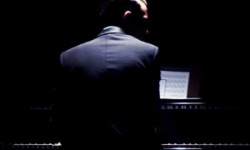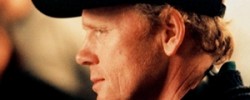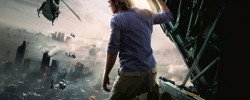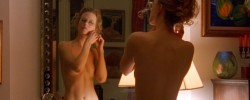
Ron Howard: A Retrospective

Editor’s Notes: Rush opens wide this Friday, September 27th.
Where does Ron Howard fit into the pantheon of great American directors? He’s hard to categorize and even harder to notice at times. Perhaps it is because his work typically carries no signature. There are obvious elements to the majority of Martin Scorsese’s films, be it thematic or editorial, that signify he is the man behind the camera. Paul Thomas Anderson delivers his own brand, as do The Coen Brothers, Spielberg, and on and on. But Ron Howard has never pinned down anything to differentiate his work. This is both a strength and a weakness when considering the portfolio of the child actor turned prolific American filmmaker. His nondescript style allows Howard to remain versatile in his work, but it also makes some of his lesser films feel generic and, ultimately, unrewarding. But every director has their misfires along the way, so perhaps the fact that his directing comes without the fanfare of a Darren Aronofsky or a ___ allows his poorer films to slide by everyone a little easier.
Where does Ron Howard fit into the pantheon of great American directors? He’s hard to categorize and even harder to notice at times. Perhaps it is because his work typically carries no signature.
We all know the background of Ron Howard because he grew up in front of our eyes, or the eyes of our parents and grandparents as young Opie Taylor on The Andy Griffith Show, then as teenager Richie Cunningham in Happy Days. Along the way, Howard would appear in countless films in the 70s and 80s, but it was clear his talent was going to flourish behind the camera. He directed himself in a small 1977 film, Grand Theft Auto, but his first major directorial effort was the comedy Night Shift starring Michael Keaton and Henry Winkler. The film was popular, but slight. Howard’s follow up was another comedy, Splash, which reached new heights of popularity for himself and its stars Tom Hanks and Darryl Hannah. From there, Howard’s career began to flourish behind the camera. Cocoon was released in 1985, and the story about a fountain of youth sent from alien life forms was a crowd-pleasing, sentimental picture that garnered a lesser follow up.
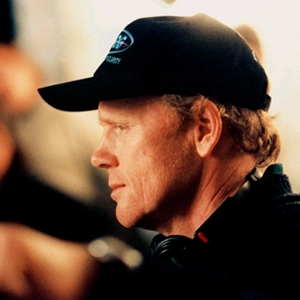
Going through Howard’s directing catalogue film by film would be unnecessary and tedious. But, like so many prolific and celebrated directors, there are highs and lows in Howards’ career. The string of hits Howard went through in the late 80s and early 90s is practically unparalleled with pictures like Willow, Parenthood, and Backdraft all finding commercial success and critical praise. His highest personal achievement was winning Best Director and Best Picture in 2002 for A Beautiful Mind, but the film is far from Howards’ best work. Apollo 13, released in 1995, is arguably his best film. Telling the true story of the doomed mission to the moon, Apollo 13 is an exercise in brilliant tension and claustrophobic desperation with a remarkable cast including Tom Hanks, Kevin Bacon, Bill Paton, Gary Sinise, and Ed Harris. While it wold eventually lose Best Picture to Mel Gibson’s Braveheart, Apollo 13 still stands out as Howard’s most magnificent technical achievement.
My personal favorite of Howard’s work still has to be Parenthood. The ensemble family dramedy is a touching look at the way fathers and children affect lives across generations. Steve Martin is technically the star, but so many wonderful actors from Rick Moranis to Jason Robards put their stamp on this film and allow it to flourish as a slice of life. Howard’s most underrated work is The Paper, another ensemble picture dealing with a day in the life of a newspaper where deadlines and daily stresses mix with the lives of its employees. The Paper is another example of Howard handling a massive cast of talent and getting the best out of them while managing to fit both humor and distress within the same scenes at times.
Ron Howard’s career has been up and down since his Best Picture statue in 2002. Around the same time he mismanaged a live-action adaptation of The Grinch, a dreary and murky-looking picture that never connected.
Ron Howard’s career has been up and down since his Best Picture statue in 2002. Around the same time he mismanaged a live-action adaptation of The Grinch, a dreary and murky-looking picture that never connected. His Western thriller, The Missing, was a commercial flop, but stars Cate Blanchett and Tommy Lee Jones are solid in their roles. Cinderella Man, starring Russell Crowe as fighter Jim Braddock trying to rescue his family from the depression, was underappreciated. And then Howard decided to direct an adaptation of the worldwide Dan Brown hit novel, The DaVinci Code, resulting in a tedious bore of a film that still managed to be the biggest commercial success of his career. The sequel, Angels and Demons, didn’t fare as well, and was equally as drab and forgetful as a film. But sandwiched in between these poor efforts was the docudrama Frost/Nixon, which put Howard back into the Oscar race in 2008.
And then there was The Dilemma in 2011, a flat, uninspired January “comedy” that was Howards’ last film until this week’s Indy Car drama, Rush. These last few years have been mediocre for Ron Howard behind the camera, and I don’t quite know what to expect from Rush. The funny thing about Ron Howard is that he has directed so many films that so many people adore, but the fact that he directed them comes as an afterthought just about every time. And that goes back to his nondescript directing style and lack of flair. Which isn’t always a negative thing. Howard’s better films almost always pack an emotional punch, and I would suggest one of his strengths is his ability to handle an ensemble. Whatever you may think of Howard, or whatever you might expect from him in the future, I would count on him delivering some great films – maybe even another Oscar winner along the way – sandwiched in between some commercial money grabs that may or may not find their audience.
Related Posts
Latest posts by Larry Taylor (see all)
- Ron Howard: A Retrospective - September 25, 2013
- Review: Prisoners (2013) - September 21, 2013
- Review: A Single Shot (2013) - September 20, 2013



















